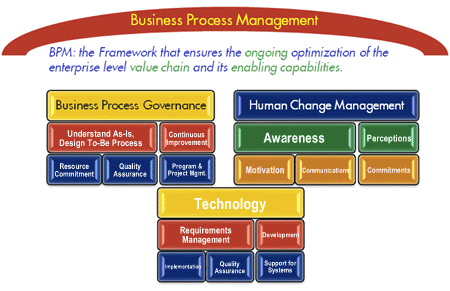Process Roles — Who are the Process Owners?
Developing roles and responsibilities for process is often difficult. There are multiple viewpoints. It commonly begins with the question of ownership and responsibility as an organization begins to understand the value of process and implement actions to manage those processes. Assignment of process ownership is one of the indicators of an increasing level of process maturity.
One of the most important questions to consider when embarking on a process journey is "Who should we select as our Process Owner(s)?" Regardless of the maturity model being used to assess processes, the creation or assignment of process ownership normally occurs one level up from status quo.
But why is this difficult? Ironically, one of the most neglected areas of transformation in any type of change is definition and assignment of roles and responsibilities. Although there is now a general acknowledgement that people are one of (if not the most) critical success factors in any type of business transformation, most organizations are not very accomplished at implementing 'people' oriented changes.
In an attempt to understand this aspect of business process management, we need to define the responsibilities of effective Process Owners.
Process Owner Responsibilities
The Process Owner is responsible for the governance of process performance and process change — and specifically:
- Defines the process mission, vision, tactics, goals, objectives, KPIs (Key Performance Indicators), and the measures that are aligned with the organization strategies.
- Monitors and reports process performance against KPIs and health versus plans.
- Synchronizes process improvement plans with other process owners within the value chain and other interfacing processes.
- Ensures appropriate process designs, including the correct business requirements.
- Defines and sponsors business process change and capability investments, which continuously increase the maturity of the process and sustain each level of maturity.
Process Owner Skills & Capabilities
Next, we need to define the skills and capabilities for Process Owners. Table 1 outlines those skills and capabilities at a high level, broken down by knowledge, skill, and expertise.
Knowledge is defined as a general awareness and understanding of the topic, sufficient to make basic decisions and provide general guidance.
Skill is defined as the knowledge plus the ability to do the work related to the topic, make general decisions, and provide the coaching to others.
Expertise is defined as knowledge plus skills with proven experience coaching and helping others, making directional decisions, setting policy, and taking the lead.
|
Knowledge |
Skill |
Expertise |
Process Management |
|
|
X |
Process Improvement |
|
X |
|
Process Design |
|
X |
|
Analyzes and Solves Problems |
|
X |
|
Communicates and Persuades |
|
X |
|
Stakeholder Engagement |
|
|
X |
Team working |
|
X |
|
One of the unfortunate consequences of Business Process Management is that a large majority of these programs are initiated in the IT/technology organization. There are very good reasons for this. One of the most common is that the IT/technology organization is responsible for providing the technology to support the business strategy. Many technology solutions are focused on solving problems in specific functional areas in the organization. As these solutions are implemented and become part of how the organization delivers value to its customers, the business often realizes that they needed the information in these systems to be available to other functional areas of the organization. Integrating the systems takes time and often causes data integrity problems as well as constraining the flexibility of the organization's processes. As the pace of change increases every day, organizations are finding it more and more difficult to respond quickly and effectively. In order to respond effectively, the IT/technology organization is motivated to understand and document the business requirements from a process perspective rather than a functional perspective. As a result, many of the resources assigned to work on the processes are in the technology organization. Naturally, often Process Owners are also selected from the IT/technology area.
The question is "Should Process Owners be former technologists, business subject matter experts, or process experts?"
With responsibilities, skills, and capabilities outlined, the final choice (for most organizations) is one of subject matter expertise. In an ideal world, we would select individuals who have all these types of expertise. However, individuals with a background that is this broad are rare. Since Process Owners are fully responsible for the process — including the process performance, process maturity, process improvements, and the performance of the resources in the process — the selection of a Process Owner is critical to the success of an organization's Business Process Management implementation.
Process Owner Tradeoffs
It's important to consider the pros and cons of Process Owners who have an extensive process background (or at least some familiarity) versus Process Owners who are business subject matter experts with little or no process background.
Process Owners with subject matter expertise but limited process knowledge and/or experience will find it difficult to understand the strategy of Business Process Management and how to apply it successfully. On the other hand, Process Owners with a process background can begin to plan and move forward within a Business Process Management program immediately. The only constraint they face is access to the business Subject Matter Experts (SMEs).
It's easy to confuse the need to improve the effectiveness and efficiency of the process with managing the functional/operational aspects of the process. It is very important to understand that Process Owners don't need to be able to manage the operational aspect of the process. They are not responsible for operating the business. They are responsible for the efficiency and effectiveness of the process.
To create effectiveness and efficiency in a process does not require the ability to manage the business covered by the process. In fact, a SME may find it difficult to see the "real" problems in the process because they are so familiar with the operational aspects, as well as the fact that they are normally only concerned with a functional portion of the process, not the whole. Therefore, they have difficulty separating the symptoms of the problems from the root cause of the problem.
The key consideration here is that organizations typically have no shortage of Business or Technical SMEs. However, Business Process Management Expertise is not normally readily available. Table 2 outlines some of these differences.
Process Owner — |
Process Owner — |
BPM Expertise |
Functional Business Expertise |
Process Work Initiated Immediately |
Process Work Delayed by 9-12 months |
Responsible for Process Efficiency and Effectiveness |
Responsible for managing the functional silos of the business |
Responsible for the Maturity of the Process |
Responsible for meeting operational Goals of functional aspects of the process |
Serve as a Coach/Mentor for Process Analysts |
Coaching and Mentoring delayed by at least 1 year, more likely 2-3 |
Provide guidance to the organization, re: process management, strategy, etc. |
Provide business knowledge guidance, but not process guidance in the near term (1-2 years) |
Process Owners who are Business or Technical SMEs will be able to fulfill their role only marginally for perhaps a year or more, even if they receive process training and have process coaching and mentoring as quickly as possible. In addition, even after they receive training, they should have a process expert assigned to them to coach and mentor them in Business Process Management. If they don't receive training — and if the coaching and mentoring programs don't exist — their opportunity for success is greatly compromised. The work will move forward in an unstructured, ineffective, and inefficient way as they try to learn on the job.
This approach would be similar to asking a medical doctor to design and build a major sports stadium. The doctor could muddle along for several years and might eventually get the stadium built just because he's a highly intelligent individual. However, the stadium would probably cost 10-50 times more, and by the time it was built, the city might not have a franchise team to use the stadium because the team got tired of waiting and moved to another city.

Figure 1.
Business Process Management Framework

Business Process Management is not a simple two- or three-step process. It encompasses every aspect of the organization. In order for an organization to successfully apply the discipline of BPM they must have individuals that understand all the aspects of BPM and how these aspects must fit together to create success in a transformed organization.
Process knowledge and experience is not as easy to acquire as many people think. In addition, individuals who may have participated in some kind of process improvement projects in their organization may not actually know anything about Business Process Management. The same is true, unfortunately, of individuals who have been involved in LEAN or Six Sigma projects. Since these types of projects are most frequently focused on addressing problems at the activity level, they may not have had the opportunity to understand or practice Business Process Management.
Final Thoughts
Many organizations have had unpleasant experiences with Re-Engineering, Business Process Management, Process Improvement, etc. In the majority of cases, it wasn't because they didn't try to make it a success but, rather, they simply didn't have the expertise in-house to do the work. So, they either hired consultants or used inexperienced individuals who did very small projects that produced disappointing results because they didn't take the time to acquire the skills and learn how to do it well.
While it's true that a lot of Business Process Management is common sense, it isn't necessarily true that everyone has common sense or that they understand how to apply common sense to their business. If an organization wants to build the stadium, they need to either
- Find architects within the company who have done this before and understand what is required,
- Hire experts from outside (which is almost always a poor choice since they walk away at some point with all that knowledge), or
- Send some of their current employees back to school to be trained as architects who can build the stadium successfully and retain the knowledge within the company so they can continue to build stadiums better and better each time.
Obviously, the perfect solution to all of this is to be able to assign the responsibility of "Process Owner" to a business SME who is also a BPM expert. The majority of organizations are not far enough along their process maturity journey to be able to leverage this solution. We should keep in mind that this is where we eventually want to go.
# # #
About our Contributor:
Online Interactive Training Series
In response to a great many requests, Business Rule Solutions now offers at-a-distance learning options. No travel, no backlogs, no hassles. Same great instructors, but with schedules, content and pricing designed to meet the special needs of busy professionals.












How to Define Business Terms in Plain English: A Primer
How to Use DecisionSpeak™ and Question Charts (Q-Charts™)
Decision Tables - A Primer: How to Use TableSpeak™
Tabulation of Lists in RuleSpeak®: A Primer - Using "The Following" Clause
Business Agility Manifesto
Business Rules Manifesto
Business Motivation Model
Decision Vocabulary
[Download]
[Download]
Semantics of Business Vocabulary and Business Rules